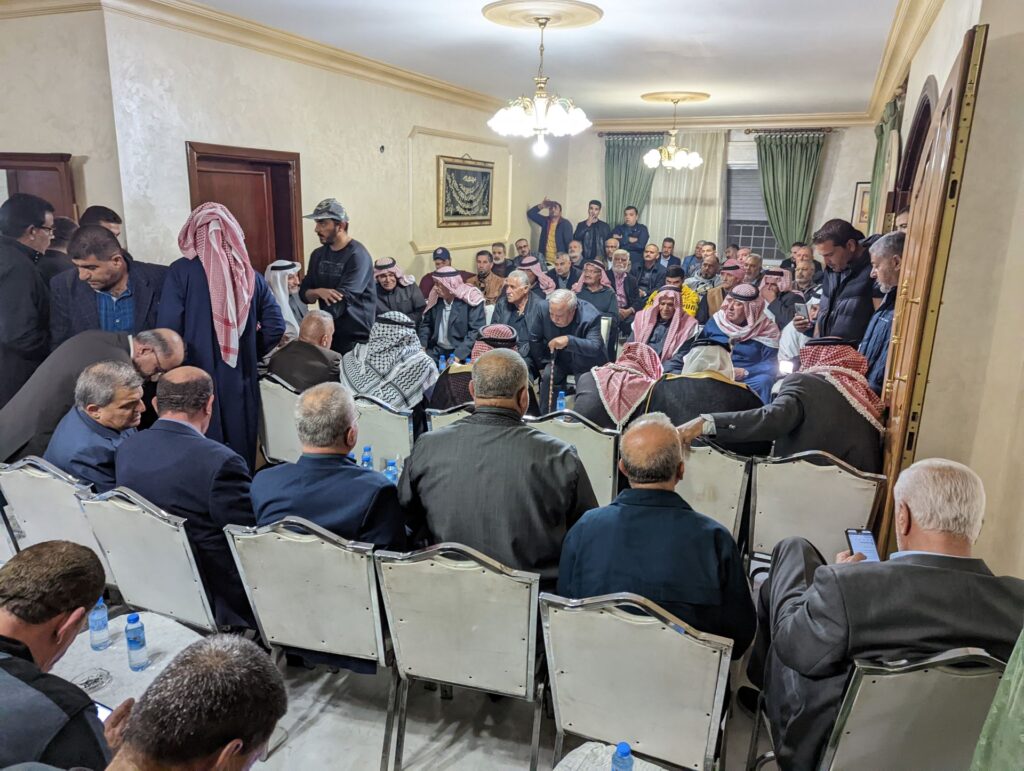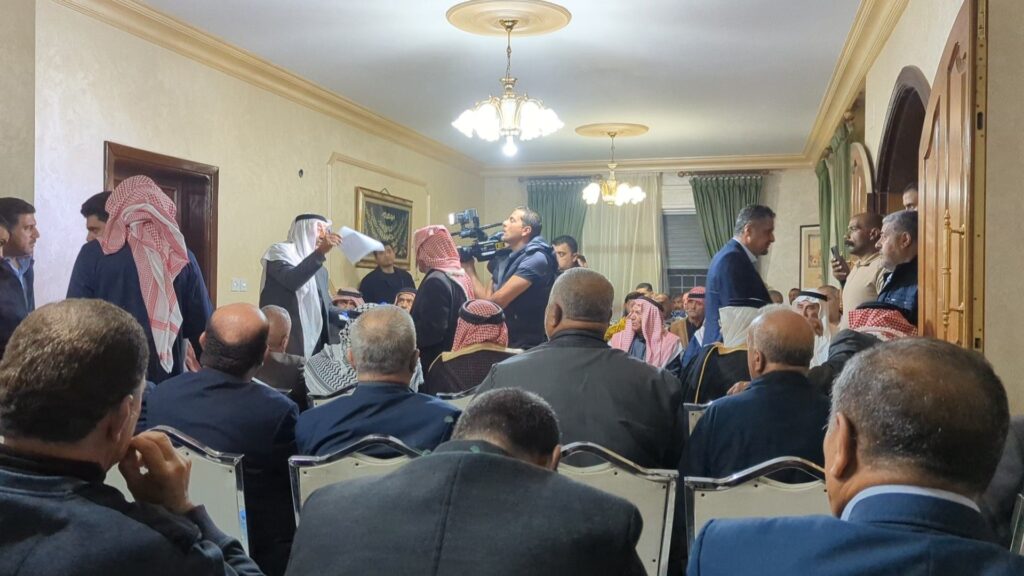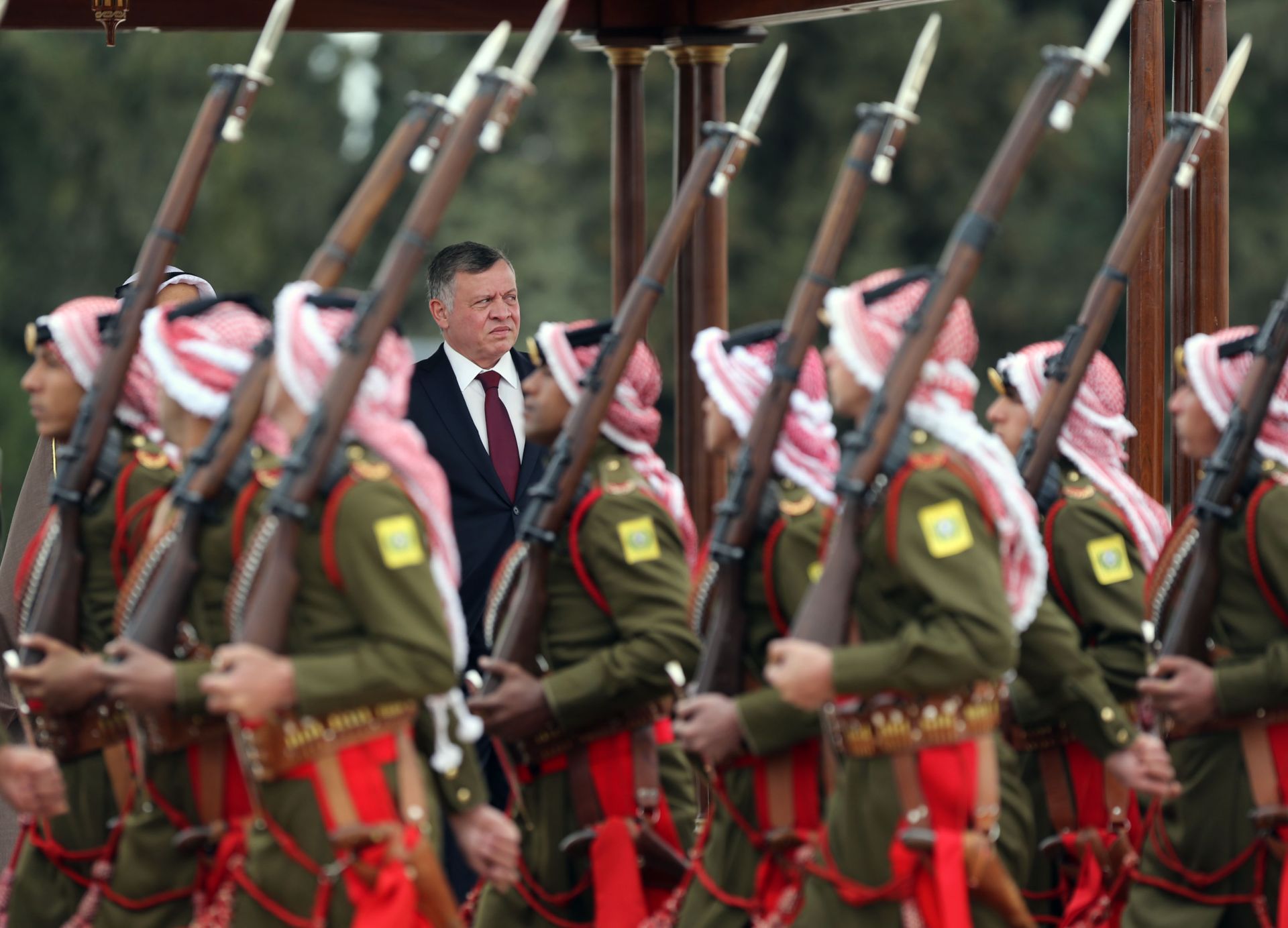Dogged mediation efforts by one of Jordan’s largest tribes and the intervention of top state officials barely contained the fallout from Mohammad Hajjaj’s murder. At dawn on Sept. 17, 2022, the young father of three was discovered shot to death. By afternoon, three houses belonging to relatives of the suspected killer had been set on fire in acts of retaliatory rioting. Although police in armored vehicles halted further unrest in the north of the capital, Amman, the grieving Hajjaj clan was set on vengeance — against the suspect, who by evening was in custody, and his family.
Two days later, a delegation of notables from Jordan’s “million strong” Bani Hassan tribe visited the Hajjaj clan at a tent complex to negotiate a truce on behalf of the accused killer’s family. The Hajjaj put forward their conditions for a deal: The accused’s relatives must publicly call for his execution and he must be denied paid counsel at trial. They also demanded that his extended family be banished from Amman and its surroundings, and that no Hajjaj be prosecuted or sued for damage caused during the riots.
Sheikh Dayf Allah al-Qallab, the visiting delegation chief, promptly agreed to the first two demands. But he rejected the rest, citing new government regulations that limit banishment to a perpetrator’s father and sons. “No one writes a truce!” shouted several members of the Hajjaj. The assembly devolved into chaos and gunfire pierced the late afternoon sky.

Following the failed negotiations, local media reported that the governor of Amman intervened to talk the Hajjaj down from their most punitive demands, at the request of the minister of the interior. One week later, al-Qallab returned to the Hajjaj clan — again flanked by an entourage in a show of respect — and was finally able to ink a truce agreement according to his earlier terms, thus shutting the door on retribution.
Although tribal law was officially abolished in 1976, many Jordanians continue to resort to it when calamity strikes, and the government continues to enforce it. In the aftermath of certain violent crimes and serious accidents, dignitaries authorized by the perpetrator and the victim’s families organize a series of truces leading to a reconciliation agreement, which involves the payment of blood money and other damages. This process usually occurs at the same time as the police investigation and court proceedings, and it weighs on the scales of justice. A tribal reconciliation deal can translate into a reduced sentence for the defendant if they are convicted at trial; conversely, tribal truces can place harsh demands on a suspected criminal and their family, including the rapid confession of guilt to police and forgoing paid counsel.
Tribal justice has been a topic of public debate for decades. Critics say that it undermines Jordan’s written laws and constitution and imposes collective punishment. Proponents concede the need for reform but argue that the informal tribal system serves the public good: By honoring the victim’s family and delivering compensation, it preempts revenge and restores group relations disrupted by bloodshed.
“Tribal justice is psychological treatment before it is material restitution,” said Talal al-Madi, a Jordanian senator and tribal sheikh. “The reconciliation isn’t completed on the basis of one individual reconciling with another. Rather, it’s ‘this tribe reconciled with that tribe,’ which increases societal security.”
“Tribal justice walks side by side with the law … so one murder doesn’t become 20,” added a source in the Ministry of the Interior who spoke to New Lines on the condition of anonymity.
Historically, the truce, banishment and reconciliation procedures were the legal customs of nomadic Bedouins, who made up nearly half the population at the state’s creation in 1921. During the 400 years of Ottoman rule that preceded the modern state, imperial authorities exercised only nominal control over the area’s Bedouin tribes. “The tribe formed a small state with its own borders, political leadership, economic resources, social makeup, and judicial system. Tribal courts played the role of regular state courts, and Bedouin judicial traditions played the role of modern state laws,” writes Mohammad Abu Hassan, one of the kingdom’s leading tribal justice experts, in his 1974 tome “Bedouin Judicial Heritage — Theory and Practice.”
Precedent was paramount for the Bedouin judiciary. “We’re followers. We don’t create laws; we don’t branch out” was a popular saying of Bedouin judges related by Abu Hassan in his book. Judges inherited their positions from their fathers and based rulings on prior cases. Oral tradition dictated every stage of the legal process, from asking an opponent to go to court to appealing a decision.
Another hallmark of Bedouin justice was collective responsibility for crime. Abu Hassan theorizes that this arose from the need for deterrence in the stateless desert. “Traditionally, anyone from the victim’s tribe has a right to inflict on anyone from the perpetrator’s tribe the punishment he deems appropriate,” Abu Hassan writes. The traditional punishments he details are still in use in Jordan: revenge attacks, banishment and the payment of blood money as well as other damages.
In its infancy, the Jordanian state made a lasting pact with the Indigenous Bedouin tribes, offering generous public employment and benefits in exchange for loyalty to the Hashemite monarchy. The tribes were allowed continued recourse to their customary law via the legalization of tribal courts in 1924. Over subsequent decades, Bedouin tribesmen swelled the ranks of the army and civil service and came to wield disproportionate political power from the kingdom’s countryside. Even as they settled into fixed houses — only 3% of Jordan’s Bedouins were estimated to be nomads by the late 1970s — the values and culture associated with nomadic desert life dominated Jordan’s national identity.
After the government enacted the Tribal Laws Abolition Law in 1976, employees of the state’s various organs continued to treat Bedouin justice as legitimate. Today, Jordan’s governors and district administrators use the threat of administrative detention, granted by the controversial 1954 Crimes Prevention Law, to cajole and compel compliance with tribal settlements on the grounds that they are preventing revenge attacks. Police officers attend truce ceremonies in uniform and politicians join tribal delegations to boost their clout. The royal court has a Tribal Advisory Bureau, which intervenes in cases liable to escalate into communal violence. A 1987 document signed by the late King Hussein, which regulates the use of tribal procedures in cases of murder, “honor” (sexual assault and sex outside of marriage), accidents and the violation of previous tribal agreements, has lent this extralegal activity a semiofficial seal of approval.
Modern governmental oversight of tribal justice has generated eyebrow-raising results. In 2016, the online magazine 7iber reported that the deputy governor of Irbid detained a man who had just finished serving his full, 20-year prison sentence for murder in an attempt to pressure his family into a tribal reconciliation deal. As his relatives were unable to cobble together the $35,000 demanded by the victim’s family, he languished in administrative detention for a year and a half. He was released only after two prominent human rights organizations intervened.
“It’s not acceptable for a judge to release someone, or for someone to be found not guilty, and then the governor goes and detains him to prevent bloodshed. This is a crime by itself, and it should be condemned, not celebrated as a part of our heritage,” said Hadeel Abdel Aziz, executive director of the Justice Center for Legal Aid, one of those two organizations.
“I’m not against tribal justice. Just because I’m defending the path towards justice and the rule of law does not mean I have to oppose tribal justice,” she continued. “But I’m against the chaos that’s occurring today under the name of tribal practices.”
Truces for murder commonly stipulate that the accused’s family be banished, a process also overseen by Jordan’s governors and district administrators. National media have reported widely on incidents in which dozens of people are banished to far-off parts of the country — their and their children’s lives upended for the suspected crime of their relative. Even tribal judges agree on the need for reform of this tradition, which was far less disruptive in the past due to the mobile nature of desert life.
“People used to go into exile for seven years because they were nomadic Bedouins. There were no buildings like today, no schools, no public sector employees, doctors, university teachers or students. They would go into exile then return and reconcile,” said the tribal judge Trad Muslit al-Fayyez.
“Now you’ll find a family home has 50 or 60 people. What have they done wrong?” he continued. “The killer’s father needs to be exiled, because he didn’t raise him properly — it’s the father’s fault.”
In September 2021, the Ministry of the Interior issued instructions, approved by the cabinet a month prior, restricting banishment to a perpetrator, their father and sons. The instructions also limit banishment to a maximum of one year (renewable), and to a nearby district. In April 2022, the governor of Amman reported that 4,244 people nationwide had subsequently returned home.
But even a refined version of tribal banishment appears to violate Article 9 of Jordan’s Constitution, which guarantees freedom of movement and place of residence, “except in cases made clear in the law.”
“There are no laws right now in Jordan which permit or organize the practice of tribal justice,” Laith Nasrawin, a constitutional scholar at the University of Jordan, told New Lines, explaining that after tribal laws were repealed in 1976, they were replaced by laws that allow people to access justice through the regular court system. He specified two additional constitutional articles violated by tribal law practices: Article 101, which says the accused is innocent until proven guilty, and Article 102, which says official courts have jurisdiction over all civil and criminal cases.
“There are gaps, there are loopholes, there are shortcomings in the [judicial] system itself. Having said that, there’s absolutely no justification … to use tribal justice in Jordan,” Nasrawin said.
The Ministry of the Interior declined New Lines’ request for an interview. However, in April 2021, Interior Minister Mazen al-Faraya stated that there were 413 tribal cases outstanding before the governors and district administrators in which efforts at reconciliation had failed. Former Interior Minister Salama Hamad reported 305 outstanding cases in 2015. These numbers likely represent the tip of the iceberg, concealing a mass of successfully resolved cases, as well as those never registered with the government.
One facet of Jordan’s official justice system has helped keep its tribal cousin alive well into the 21st century: Jordanian law recognizes both the public’s interest and the victim’s interest in bringing a criminal to justice, called the public and private right. As part of a tribal reconciliation agreement, the victim (or their inheritors) concedes the “private right,” which permits the court to significantly reduce the defendant’s sentence.
“If I’m a murderer, and I completed a tribal reconciliation, and I showed the tribal reconciliation document in the murder case, instead of execution, I’ll get 20 years to life. If my initial ruling was 20 to life, it will go down to 10 years,” explained Ali Sukkar, a lawyer specialized in criminal law in the greater Amman area. Manslaughter in Jordan carries a punishment of six months to three years’ imprisonment; if the victim’s family concedes the private right, this typically results in a suspended sentence.
I saw the beginning of this process at work when I was invited to a truce delegation that was headed to Zarqa city to visit the family of a man killed in a horrific car crash. Days earlier, a driver was racing through suburban streets, reportedly at over 110 miles an hour, when he collided with his victim, who was unloading chickens on the side of the road, decapitating him.
After the delegation of sheikhs and notables arrived in Zarqa, they prayed the evening prayers, then filed down the street and into the assembly hall where the victim’s party was waiting. “I only know the deceased youth Rashid from his picture. I am reminded of my own lost son, and I feel the same pain I did on the day my son died,” said the delegation head after everyone had taken their seats.

No anger was visible at the ceremony. By the time the narrow salon had filled with cigarette smoke, the two parties had signed a truce. The driver and victim’s families inked a reconciliation deal a month later, involving a blood money payment of $42,000, on top of the $28,000 insurance payout, Sukkar told me. In light of this agreement, the driver received a suspended six-month sentence.
There are indications that the enduring popularity of Bedouin justice does not sit right with Jordan’s modernizing King Abdullah II, who has made the rule of law — the written law — a cornerstone of his reform agenda. Sayel Abu Tayeh, an adviser with the monarchy’s Tribal Advisory Bureau, told 7iber magazine as much in a 2016 interview. Abu Tayeh said that tribal law in Jordan had historically applied to nomadic rather than sedentary tribes, and its continued use, long after the Bedouins had settled into fixed homes, flew in the face of royal wishes.
“If I get into a fight with my neighbor, I’m supposed to demand a truce in a country that has laws and systems!” Abu Tayeh said rhetorically. “The current elite — among them officials, ministers and holders of bachelor degrees — do not understand the king and queen’s vision and are dragging society backwards.”
In recent years, the Tribal Advisory Bureau has taken a reforming stance toward tribal law. The bureau helped prepare the banishment changes introduced in 2021, as well as legislation to regulate the value of blood money settlements, because a common sticking point in the tribal truce and reconciliation process occurs when the victim’s family demands astronomical compensation. These actions indicate that even if Abdullah is discomfited by Bedouin justice, it is so well entrenched among his government and people that he has opted for incremental reform.
“The tribe’s abaya is coming off bit by bit from the new generations of people from tribal backgrounds,” said Mohammed Shamma, a journalist focused on human rights. “But I don’t think [tribal justice] will disappear. It’s certain that it’s not in the state’s interest for it to disappear. … The government officials themselves don’t want it to disappear.”
Sign up to our mailing list to receive our stories in your inbox.



